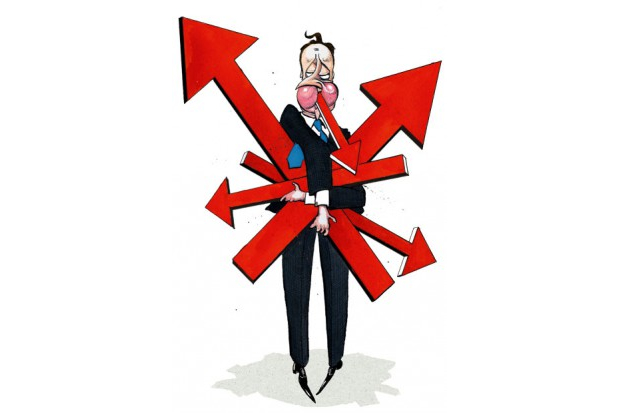Listen
It is not mere hyperbole to say that the period between the Conservative party conference and the general election will be momentous. The next election will decide whether we have a chance to vote on Britain’s relationship with the European Union. Both Labour and the Conservative party will try to tackle ‘the English question’ — together with other great issues raised by the Scottish referendum. It is vital that the right David Cameron turns up to these debates.
Even more than most politicians, Cameron is a man of two halves: steady-as-she-goes pragmatist and radical reformer. On the face of it, he fits firmly into the tradition of squirearchical managerialism. No modern Tory leader has been so good at looking calm under fire, so keen on work-life balance, so skilful at surrounding himself with friends, as if government was a boring village fête that you simply have to attend, so you might as well have some chums around while you are at it. There is something of Arthur Balfour, who never woke up before 11 a.m., perfected his swing on a private golf course, and said ‘nothing matters very much and few things matter at all’.
At times this insouciance can be effective — most notably after his election near-victory in 2010, when Cameron cut the deal that got him into No. 10. At times it is lazy. Over Scotland, Cameron lurched from complacency to panic without finding time for reflection. Cameron, the quintessential bright PPE undergraduate, who puts off doing his essay to the last moment and then stuffs in anything that he thinks will keep his tutor happy. Government by essay crisis has replaced government by sofa.
Yet there is a more radical Cameron. The insouciance is partly an act. He is a political professional who can hold his own with mandarins or Eurocrats. The chum-ocracy includes some serious thinkers such as George Osborne, in the cabinet, and Christopher Lockwood, in the policy unit. Remember how Cameron forced his way to the leadership: the no-notes speeches, the green agenda and his support for gay marriage. All were huge gambles at the time.
A few months ago it looked as if Cameron had decided to fight the election by presenting himself as a safe pair of hands. He sidelined the most energetic reformer in his cabinet, his old friend Michael Gove, and replaced him with the eminently forgettable Nicky Morgan. This strategy was as simple as it was unexciting: bet on a recovering economy and an unappealing opposition leader to bring home the votes.
But the Scottish referendum has made steady-as-she-goes more difficult, placing Britain in the grip of a fiery debate about the constitution. Should Scottish MPs be allowed to vote on purely English affairs when English MPs cannot vote on purely Scottish ones? Why don’t Northumberland and Cornwall deserve the same rights as Wales and Scotland? Cameron cleverly presented the ‘no’ campaign’s victory as a vote to renew the Union. But the fact that 45 per cent of Scotland’s population voted to abandon one of the world’s oldest and most successful countries has sent an electric shock through the establishment.
Cameron may try to wait out the storm — most people’s desire to answer the West Lothian question fades with time. But the problem with default passivity is that it just delays the inevitable: even if these issues fade from the news in coming weeks, they will be back again, probably with a vengeance.
In fact, Cameron now faces a glorious opportunity, if only he’d seize it. He has a chance to reshape British politics just as fundamentally as Mrs Thatcher did — but only if he thinks and acts like a statesman rather than a panicked undergraduate. He needs to take the inchoate anger at the political system and turn it into a movement to reinvent Britain’s bloated political regime.
The problem which haunts Britain is not a problem of representation. It is the problem of the size and scope and sheer outdatedness of the state. Transferring power from London to the regions — omni devo — is not much of an answer. As long as the state takes such a big chunk of our income, it will always transfer too much power to bureaucrats. Whether you put those bureaucrats in London, Edinburgh or Newcastle is of secondary importance. As long as the state continues to overpromise, overcharge and underdeliver, it will continue to provoke mass fury.
Cameron is in a surprisingly good position to make this argument. For all his insouciance, the great chillaxer has already presided over the biggest reduction in the size of the state since the second world war. This has required a steady nerve — defying great global institutions such as the IMF and big economic beasts such as Larry Summers. The state now takes 42.5 per cent of GDP, compared with 46.3 per cent four years ago, and the government plans to reduce that figure to 37.8 per cent in five years’ time. There are 79,000 fewer civil servants than when he came to power.
There has been a quiet revolution, with the Prime Minister signalling left while turning right. Cameron made a big fuss about ringfencing overseas aid and the National Health Service. But at the same time he has sold off government buildings, trimmed departments and forced councils to share facilities. He has at least one big reform to his credit, the spread of free schools, and the beginnings of another, in welfare. This is a sphinx with a secret.
In his quiet way, Cameron has been reviving a great British tradition. For half a millennium our rain-sodden island has been the West’s laboratory of government. Britain has led the way in each of the three revolutions that redefined the western state.
The first revolution was the rise of the nation-state in the 16th and 17th centuries. It was a British philosopher, Thomas Hobbes, who most clearly argued that the central role of the state is to provide law and order. And after the Civil War (the backdrop to Hobbes’s Leviathan) it was the British state that most successfully provided this security without smothering private economy.
The second revolution — and the most relevant to the Conservatives today — was the liberal one of the late 18th and 19th centuries. Britain succeeded in reducing the tax burden from £80 million in 1816 to £60 million in 1846, while providing better public services (from Sir Robert Peel’s policemen to Sir Edwin Chadwick’s sewers). They performed this miracle in part by waging a constant war on waste — William Gladstone boasted about ‘saving candle ends and cheese parings for the good of the country’ — but more importantly by replacing appointments by patronage and connections with appointment by merit.
The third revolution was the rise of the welfare state. British socialists such as Sidney and Beatrice Webb created one of the world’s bossiest, most centralised welfare states.
Thatcher had mixed success in dismantling the Fabian state: she did sterling work in privatising utilities and taming the unions, but failed to reform the core of the public sector and centralised power even further. Government continued to grow under Tony Blair — and especially Gordon Brown.
The great untold story of Cameron’s premiership is that he has embarked on a grand project to complete Thatcher’s unfinished revolution. Thatcher frequently promised more than she delivered. Cameron has done the opposite. In Whitehall, many insiders are stunned by the extent of the change. In the wider world, Britain is now mentioned alongside other countries that have introduced radical overhauls of the state, such as Sweden, Singapore and Estonia.
Many of Cameron’s closest advisers see no reason to interfere with this formula — why shine a light on his murky magic? But that attitude was misguided even before the Scottish referendum. The great reformers of the past succeeded because they had big ideas that held their programmes together: liberty in the case of the Victorian liberals and efficiency in the case of the Fabians. Without a guiding principle, Cameron’s reforms risk collapsing into a meaningless hodgepodge. His attempted NHS reforms have been a disaster. By contrast, voters accepted austerity because he had explained it to them.
Cameron needs to put two big ideas at the heart of his re-election campaign: modern-isation and localism. Much of what needs to be done to the British state is pragmatic modernisation. Cameron’s central pitch can be that the British public sector needs to be brought up to date with the world of electronic communications and performance-related rewards in exactly the same way in which the 18th-century state — or ‘Old Corruption’ as it was known — was brought up to date with the world of railways and open competition. The great managerial and technological changes that have swept through the private sector in recent years have left the public sector behind — and everybody knows it. The productivity of Britain’s private sector has more than doubled since the 1990s, while the productivity of the public sector has declined.
Such pragmatic modernisation plays to Cameron’s strengths — and will help to reassure Middle England, while forcing Labour to defend today’s equivalent of ‘Old Corruption’ in the form of public-sector unions.
But that hardly quells people’s fury with the status quo. Cameron needs to link the big idea of modernisation with the big idea of decentralisation. His government has made a start — sometimes in the form of political localism (elected mayors and police commissioners) and sometimes in the form of institutional empowerment (free schools and GP fund-holders). George Osborne has floated the idea of creating a northern super-city linked by a fast rail network. Cameron needs to take this further by devolving tax-raising powers and creating more mayors. Crucially, he needs to argue the case for devolving power not just from central politicians to local ones, but from the state to parents, voluntary organisations and start-ups.
Just as crucially, he needs to point out that modernisation and decentralisation go hand in hand. Modernisation without decentralisation results in technocracy. Decentralisation should not be about moving antiquated institutions from London to the -provinces. The Liberal Democrats and the Labour party are only offering decentralisation. Only the Tory party can yoke the two together to create a leaner state. The sphinx has everything to gain from revealing his secret: Margaret Thatcher was given a state funeral, while Arthur Balfour is best remembered by historians of golf. The stars are aligned for a great reforming administration to reinvent the state for the age of internet, consumer choice, exasperated citizens and cash-strapped governments. Cameron needs to decide in favour of radicalism.
Got something to add? Join the discussion and comment below.
Get 10 issues for just $10
Subscribe to The Spectator Australia today for the next 10 magazine issues, plus full online access, for just $10.
Adrian Wooldridge is the author, with John Micklethwait, of The Fourth Revolution: the Global Race to Reinvent the State (Allen Lane).
You might disagree with half of it, but you’ll enjoy reading all of it. Try your first month for free, then just $2 a week for the remainder of your first year.















Comments
Don't miss out
Join the conversation with other Spectator Australia readers. Subscribe to leave a comment.
SUBSCRIBEAlready a subscriber? Log in